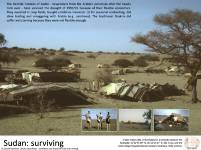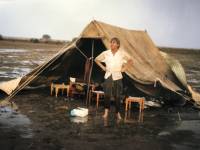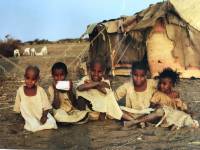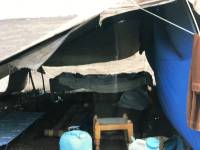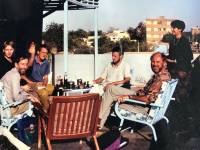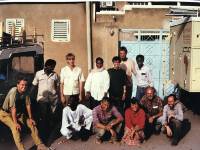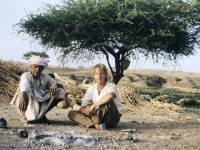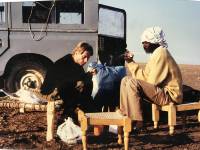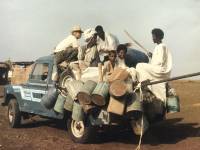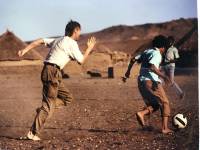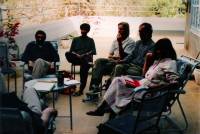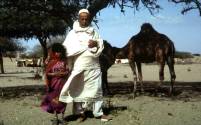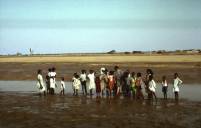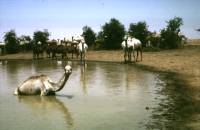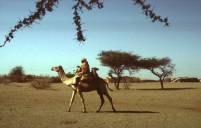Guru Geri in Sudan
After my diploma thesis on dairy cow husbandry in Malawi, Prof. Manig offered me the opportunity to work on the project "Recent developments in animal husbandry in the Sahel" and to write my doctoral thesis. Since I wanted to work in an exciting tropical country for the rest of my life, the offer was very attractive for me. I accepted. The problem was that I got to know Klaudi after I had accepted the offer, I let go of all my girlfriends, married her and she was pregnant. Nevertheless I drove, although the field stay was supposed to last 16 months. The field stay had been reduced afterwards fortunately from August 1991 to April 1992, because of the extreme drought in the field.
In Sudan I experienced in a fundamentalist country how proud but also wrong people can be who have power (Sheiks, Fundis) and people who are simple and without power (women, nomads). My tolerance for other behaviors has come under strong pressure and has led me to not accept everything that others do anymore. Third degree infibulation in girls, Sharia in misdemeanours and oppression of the poor (tearing down slums) are not acceptable to me.
The work was in the east of Khartoum, where I lived with the nomads Shukria and Rashaida for several months to get to know their economy under the conditions of the drought (this was necessary depending on the situation). The Shukria were caught up in their 1000 year old nomadic tradition and had little chance against the farmers, the Rashaida (coming from Saudia Arabia only 100 years ago) could secure themselves by entering the agriculture. An important indicator of drought was the increasing number of Mercedes Benz, as some had advantages over the misery and hunger of the people (food aid, sorghum stocks).
It was so hot in autumn that the thermometers burst. It was so hot that breathing was difficult. 40°C at night, 60°C during the day and every day for months. How I longed for a cool beer. The food and sleep was also not rich and healthy. I was emaciated to less than 60 kg. Malaria was soon normal for all of us.
Heike Bremm was with me as an ethnologist with the nomads. She was supposed to work on the role of women. She had little hard core experience with the difficult conditions. Heike is overwhelmed by these living conditions, had to return to Germany in an emergency and died later as a result of her stay in the field. That did not have to be the case. For me it was clear that I had such a stay with my responsibility for the family that I had meanwhile (I only knew when I was on my home leave at Christmas). Unfortunately we could not telephone and write, because the communication technology (even world receiver) had not advanced so far yet.
With the time I got along well with the situation in the Sahel zone and the living conditions. But it was really hard. The longing for Klaudia was the worst (I dreamed of a telephone action practically every night: a telephone call always failed for various reasons).
I had a simple usual tent like the nomads, we went through the landscapes at regular intervals. The 300 people big Tribes were very hospitable, but many were doing "night economy". This helped them to survive. I lived / ate with the poorest, because my meal contribution helped them.
I liked Khartoum very much, very degenerate but urarabic. I could entertain myself well in Arabic and had a good interpreter (Mohamed), who was always in a good mood and was looking intelligently for many problems. With time I got along well with the situation in the Sahel zone and the living conditions. But it was rock-hard. The longing for Klaudia was the worst (I dreamed of a telephone action practically every night: a telephone call always failed for various reasons).
Exciting were also the tours to the markets (New Halfa, Gedaref, Kassala, Omdourman, Gezira), the visits at the rivers Atbara, Blue Nile. I never want to regret the ride, but I never want to repeat it. After the field stay I could not take the banal problems in Germany seriously any more. I completed my thesis as a doctoral thesis, even though I didn't really understand everything during my "participating observation". But I learned a lot for myself.
